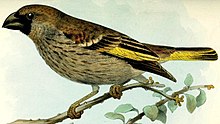The genus Rhynchostruthus is a small group of finches in the family Fringillinae. Commonly known as golden-winged grosbeaks, they are attractive, chunky, medium-sized, robust-billed songbirds restricted to the southern Arabian and northern Somalian regions.
| Golden-winged grosbeaks | |
|---|---|

| |
| Socotra grosbeak, Rhynchostruthus socotranus | |
| Scientific classification | |
| Domain: | Eukaryota |
| Kingdom: | Animalia |
| Phylum: | Chordata |
| Class: | Aves |
| Order: | Passeriformes |
| Family: | Fringillidae |
| Subfamily: | Carduelinae |
| Genus: | Rhynchostruthus P.L. Sclater & Hartlaub, 1881 |
| Type species | |
| Rhynchostruthus socotranus[1] P.L. Sclater & Hartlaub, 1881
| |
| Species | |
|
Rhynchostruthus louisae | |
These elusive birds are typically found between 1,060 and 2,800 metres ASL in forested wadis and areas of scrub. The fruits of junipers, acacias and spurges appear to form the bulk of their diet.
Description edit
These birds have slight sexual dichromatism. Males are grey-brown overall with a black bill, dark mask, white cheeks, and large, bright yellow patches on the wings and tail. The extent of the dark head-pattern and white cheek-patches varies considerably between taxa. The females are similar to the males though somewhat duller, and the juveniles are rather streaky and lack the adults' distinctive head pattern.
Systematics edit
The large bill suggests a relationship with the Asian grosbeaks - e.g. Mycerobas - but its song and calls are reminiscent of European goldfinch Carduelis carduelis, European greenfinch C. chloris, and Yemen linnet C. yemenensis. Also it has been observed performing a greenfinch-like slow-winged display flight which suggests its true affinities may lie within the genus Carduelis. Altogether, Rhynchostruthus seems to belong to a group of Carduelinae which includes such birds as Carduelis, the oriole finch (Linurgus olivaceus), and the canaries, many of which have large amounts of brilliant yellow plumage. But the exact placement of the golden-winged grosbeaks is not very well resolved. Molecular genetic studies have shown that Rhynchostruthus and Rhodospiza form a distinct clade but are not closely related to any other of the birds commonly referred to as "grosbeaks".[2]
The genus used to contain a single species, Rhynchostruthus socotranus. But more recently this is often split into three:[3][4]
- Socotra golden-winged grosbeak, Rhynchostruthus socotranus
- Arabian golden-winged grosbeak, Rhynchostruthus percivali
- Somali golden-winged grosbeak, Rhynchostruthus louisae
References edit
- ^ "Fringillidae". aviansystematics.org. The Trust for Avian Systematics. Retrieved 2023-07-16.
- ^ Zuccon, Dario; Prŷs-Jones, Robert; Rasmussen, Pamela C.; Ericson, Per G.P. (2012). "The phylogenetic relationships and generic limits of finches (Fringillidae)" (PDF). Molecular Phylogenetics and Evolution. 62 (2): 581–596. doi:10.1016/j.ympev.2011.10.002. PMID 22023825.
- ^ Kirwan, G.M.; Grieve, A. (2007). "Studies of Socotran birds II. One, two or three species: towards a rational taxonomy for the Golden-winged Grosbeak Rhynchostruthus socotranus". Bulletin of the African Bird Club. 14 (2): 159–169. doi:10.5962/p.309814.
- ^ Gill, Frank; Donsker, David (eds.). "Finches, euphonias". World Bird List Version 5.2. International Ornithologists' Union. Retrieved 5 June 2015.
External links edit
- Socotra Grosbeak photographs. Retrieved 2008-MAY-27.